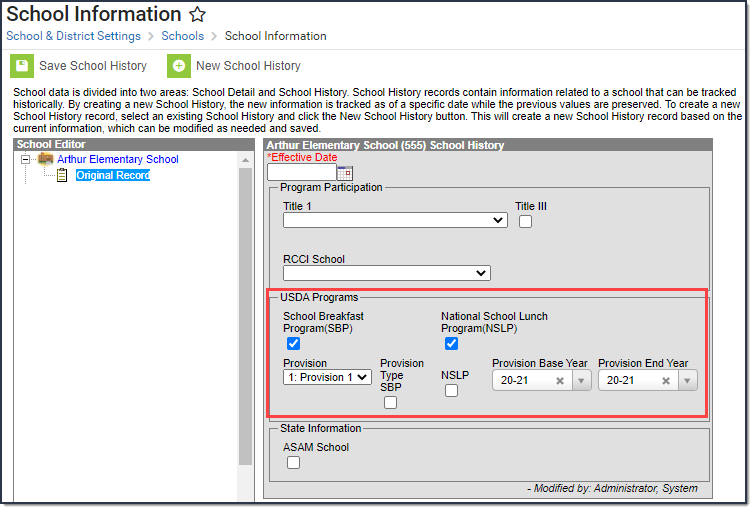Tool Search: School Information
When you create a school, you must select options that indicate whether the school participates in the School Breakfast Program (SBP), National School Lunch Program (NSLP) and/or Title III. Provision fields are also provided to help identify whether a school has a Provision 1, 2, 3, 4 or CEP status and identify if Provision Type is SBP, NSLP, or both.
The School Breakfast Program (SBP) and National School Lunch Program (NSLP) checkboxes above the Provision Type are utilized for other reports. A school can participate in SBP and NSLP, but the school may not have Provision status in both programs.
If a Provision is selected, the Provision Type, Provision Base Year and Provision End Year must be selected to save the record.
At this time, state reporting and food service functionality is not affected by the Provision fields. However, if Provision fields are entered for schools with the Educational Benefits Applications Processed FRAM Preference set, Educational Benefits Applications will appear for the Provision Base and End Year entered.
USDA Programs
Field | Description |
|---|---|
School Breakfast Program (SBP) | This checkbox indicates whether the school participates in the School Breakfast Program. This field must be selected for some state reports and for the FRAM Verification Final Summary Report. |
National School Lunch Program (NSLP) | This checkbox indicates whether the school participates in the National School Lunch Program. This field must be selected for some state reports and for the FRAM Verification Final Summary Report. |
Provision | This field indicates the Provision in which the school is participating. The National School Lunch program includes the following provisions.
|
Provision Type | These checkboxes indicate if the Provision is for the School Breakfast Program (SBP), the National School Lunch Program (NSLP), or both. |
Provision Base Year | Indicates the base year in which the Provision began. |
Provision End Year | Indicates the year in which the Provision will end. If the year entered in this field is a current or future school year, the Educational Benefits Applications preference becomes available for selection on the FRAM Preferences tab. |
For information on these programs, see the following:
United States Department of Agriculture
United State Department of Education

